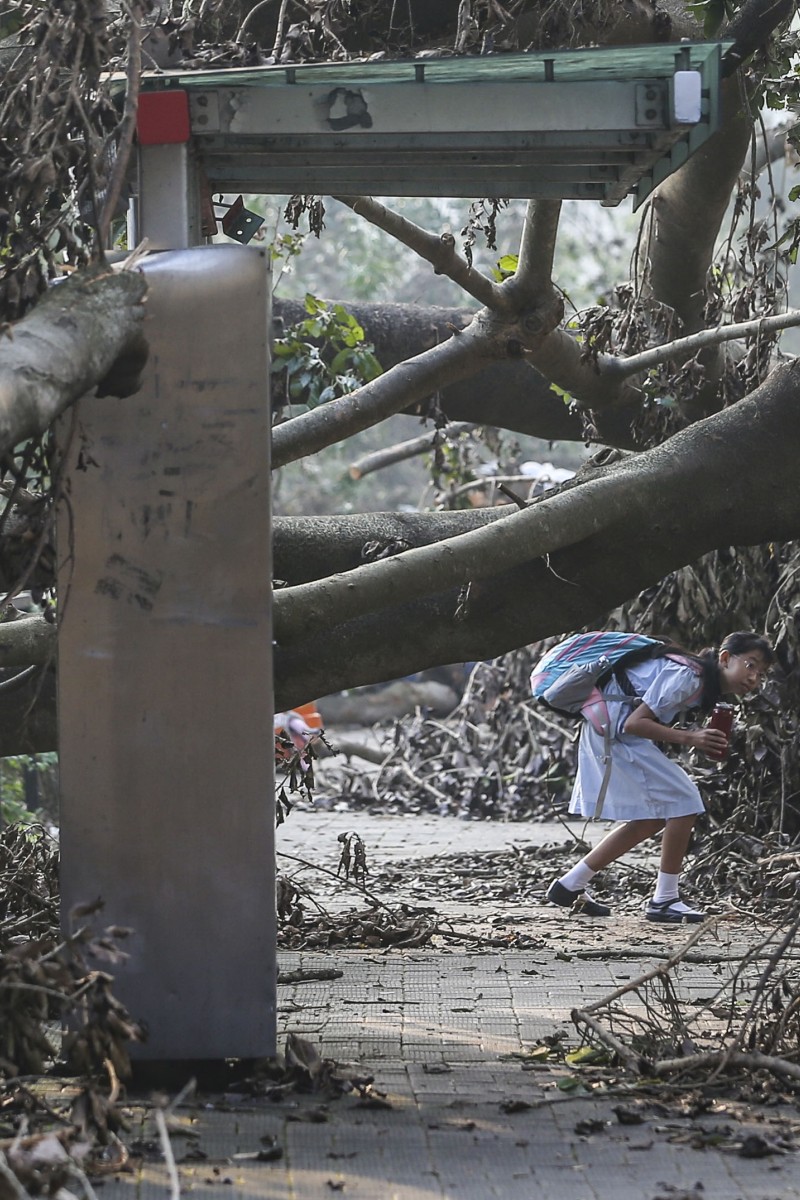
Talking points: Should Hong Kong close schools the day after a T10?
Hate it when you can’t talk back? Well, you can with Young Post. Have your say and share with students around Hong Kong
 Typhoon Mangkhut caused mass chaos in the aftermath as people were unable to get to work.
Typhoon Mangkhut caused mass chaos in the aftermath as people were unable to get to work.Matthew Lin Kai-him, 17, Law Ting Pong Secondary School
Yes, because it would keep students safe. After a T10, many overhead signs might be loose, and could fall on passers-by. There might also be a lot of traffic, and students might not be able to get to school on time anyway. Even if some students make it to school, their teachers or classmates might not be able to get there. I don’t see why schools should be kept open the day after a T10.
Rachel Cheung, 14, Tak Nga Secondary School
Absolutely yes! Super Typhoon Mangkhut caused a lot of damage to many buildings and trees. In some places, people were even trapped in their homes. Even two days after the typhoon, many schools remained closed because there a lot to clean up. How could students study in such conditions? How could they have arrived at school safely, if there were no buses, and limited MTR services? And even if they got there, where would they have studied?
Talking Points: Should cyberbullying be treated as a crime?
Hannah Faith Chak, 18, Po Leung Kuk Wu Chung College
It might not always be necessary. Super Typhoon Mangkhut was the most severe storm to ever hit Hong Kong, and caused a lot of damage to the city. I can see why schools had to be closed, because it reduces the risk of students being hurt and gave staff the
time to tidy up. However, if the roads are not blocked by trees, transport is running, and the schools are not damaged, I don’t see the point of closing schools the day after a T10.
Chesney Ng Cheuk-nam, 15, Henrietta Secondary School
The government should always close schools the day after a T10, because of two reasons. One, the roads might be blocked by trees or other things, making it unsafe for students to go to school. Two, students should be given a day to relax and to not worry about classes. They will then go back to school the day after happier and in a better mood.
Choi Lok-lam, 18, Scientia Secondary School
The safety of students comes first. After a typhoon, there is a lot of rubbish everywhere. We saw on the news that many buildings were damaged. Some even had their windows blown out, which means there was glass everywhere. After the typhoon, the government sent people to clean up, but there is a lot of damage to deal with. For these reasons, the government should always close schools the day after a T10. The roads are very unsafe after a typhoon because there can be landslides in some areas. This can cause roadblocks, and create traffic jams. Public transport will not run normally. Because of this, it would be better for students to remain at home – there might not be much point trying to get to school anyway.
Talking Points: Should students be required to complete homework over the summer?
Judy Cheung, 15, Fung Kai Liu Man Shek Tong Secondary School
A T10 is a very powerful typhoon. Such a storm causes a lot of damage, such as uprooted trees blocking roads. This causes traffic jams. Even bus and train services can be disrupted. Students should get the day after a T10 off and remain where they are safe – in their homes.
Vivian Lee, 15, Tak Nga Secondary School
The government should close schools the day after a T10 to ensure students’ safety. An extremely strong typhoon might make schools an unsafe place – there might be broken windows, collapsed trees, and flooded classrooms. These are problems that need to be dealt with before students arrive for class. In addition, there will be a lot of traffic jams. This is why schools should remain closed.
Valerie Chan, 14, Daughters of Mary Help of Christians Siu Ming Catholic Secondary School
Yes, I believe so. Getting to school after a severe typhoon is extremely difficult. Fallen debris and trees blown down by the wind may block roads and pathways. As we can see from the aftermath of Super Typhoon Mangkhut, many roads were closed and there were no bus services. The MTR stations were full of frustrated commuters just trying to get to work. It would be impossible for students to safely get to school on time after such a destructive day.
Glass, concrete, and other materials can be found everywhere. These things pose serious safety risks to students. A typhoon is devastating enough – we don’t need to hear about students being injured on their way to school. Many schools in Hong Kong use technology to facilitate learning. If there is a power failure after a T10, how can students learn anything? Although education is important, I don’t think missing a day or two at school matters a lot; students’ safety is more important.
Rain Wong Tsz-wang, 17, Henrietta Secondary School
I don’t think so. First, the government should check out the damage after a severe typhoon, then assess whether it would be safe for students to go to school. That’s the best way to deal with such a situation.
Lo On-yin, 15, Hong Kong Weaving Mills Association Chu Shek Lun Secondary School
Obviously yes, because the students’ safety should always come first. Typhoons often cause landslides and flooding, while fallen trees block roads – all this makes it hard for students to get to school, which might be damaged and unsafe to study in anyway. The Education Bureau has a responsibility to protect students.
In our next Talking Points, we’ll discuss:
Should there be limits on what political parties are allowed to operate in Hong Kong?
We are now accepting your answers for this topic. To take part, email your answer with your name, age, and school, along with a nice, clear selfie (make sure it’s not blurry), to [email protected] by lunchtime on Monday. Don’t forget to include “Talking Points” in the subject line.
